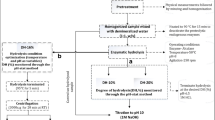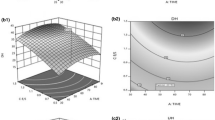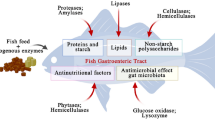Abstract
The objective of this study was to evaluate the enzymatic protein hydrolysis of viscera Macrobrachium rosenbergii shrimp processing, as an alternative procedure for the hydrolysis of this residue. For this, shrimp residues were collected, the viscera were separated, and the samples were processed. The enzymes Alcalase® 2.4L and Flavourzyme® 1000L were added for the hydrolysis process, and 2 experimental designs were carried out. Subsequently, the design of the rotational central compound was carried out on the effect of three factors, each at five levels: temperature and concentration of enzymes. The temperature had a greater influence on the protein enzymatic hydrolysis of the shrimp viscera, obtaining values of the degree of hydrolysis (DH) of 2.11 ± 0.25% at the temperature of 67.8 °C, and concentration of the Alcalase® 2.4L and Flavourzyme® 1000L 0.50% enzymes. However, one of the control reactions had a DH of 2.06 ± 0.11% at a temperature of 61.0 °C, which was statistically equal to the value found for the enzymatic reaction. For the tests at 51.0 °C, an optimized reaction yield with DH of 1.88 ± 0.23% was obtained. Thus, it was possible to solubilize the protein present in shrimp viscera, making the hydrolyzate a source of protein for aquaculture.







Similar content being viewed by others
Data availability
Not applicable.
Code availability
Not applicable.
References
Adler-Nissen J (1986) Enzymic hydrolysis of food proteins. Elsevier Applied Science, London, pp 365–404
Alves HJ, Gasparrini LJ, Silva FEB, Caciano L, de Muniz GIB, Ballester ELC, Cremonez PA, Arantes MK (2020) Alternative methods for the pilot-scale production and characterization of chitosan nanoparticles. Environ Sci Pollut Res 28:10977–10987. https://doi.org/10.1007/s11356-020-11343-5
Amiza MA, Kong YL, Faazaz AL (2012) Effects of degree of hydrolysis on physicochemical properties of Cobia (Rachycentron canadum) frame hydrolysate. Int Food Res J 19(1):199–206
Araripe MNBA, Lopes JB, Castro PL, Braga TEA, Ferreira AHC, Abreu MLT (2011) Redução da proteína bruta com suplementação de aminoácidos em rações para alevinos de tambatinga. Ver Bras De Zootec 40(9):1845–1850. https://doi.org/10.1590/S1516-35982011000900001
Association of Official Analytical Chemists (AOAC) (2010) Official methods of analysis of AOAC international, 18 th edn., Washington DC
Baek HH, Cadwallader KR (1995) Enzymatic hydrolysis of crayfish processing by-products. J Food Sci 60:929. https://doi.org/10.1111/j.1365-2621.1995.tb06264.x
Balti R, Jridi M, Sila A, Souissi N, Nedjar-Arroume N, Guillochon D, Nasri M (2011) Extraction and functional properties of gelatin from the skin of cuttlefish (Sepia officinalis) using smooth hound crude acid protease-aided process. Food Hydrocoll 25(5):943–950. https://doi.org/10.1016/j.foodhyd.2010.09.005
Brito MS, Oliveira CFS, Silva TRG, Lima RB, Morais SN, Silva JHV (2008) Polissacarídeos não amiláceos na nutrição de monogástricos – revisão. Acta Vet Bras 2 (4):111–117. https://doi.org/10.21708/avb.2008.2.4.917
Cahú TB, Santos SD, Mendes A, Cordula CR, Chavante SF, Carvalho LB Jr, Nader HB, Bezerra RS (2012) Recovery of protein, chitin, carotenoids processing waste. Process Biochem 47(4):570–577. https://doi.org/10.1016/j.procbio.2011.12.012
Cheong JY, Azwady AA, Nor Rusea G, Noormasshela UA, Shaziera AG, NurulAzleen AA, Muskhazli M (2014) The availability of astaxanthin from shrimp activity of carotenoprotein from shells of Pacific white shrimp extracted using hepatopancreas proteases. Food Biosci 5:54–63. https://doi.org/10.1016/j.fbio.2013.11.004
Costa SR, Souza PAR (2012) O impacto dos resíduos de pescado: o caso da “Feira do Bagaço no município de Parintins no Amazonas. DELOS: Desarrollo Local Sostenible 5(14):1–11.
Damodaran S, Parkin KL, Fennema OR (2010) Química de Alimentos de Fennema, 4ª. Artmed, São Paulo
Delcroix J, Gatesoupe FJ, Desbruyères E, Huelvan C, Le Delliou H, Le Gall MM, Zambonino-Infante JL (2015) The effects of dietary marine protein hydrolysates on the development of sea bass larvae, Dicentrarchus labrax, and associated microbiota. Aquac Nutr 21(1):98–104. https://doi.org/10.1111/anu.12139
Dey SS, Dora KC (2014) Optimization of the production of shrimp waste protein hydrolysate using microbial proteases adopting response surface methodology. J Food Sci Technol 51(1):16–24. https://doi.org/10.1007/s13197-011-0455-4
Duarte de Holanda H, Netto FM (2006) Recovery of components from shrimp (Xiphopenaeus kroyeri) processing waste by enzymatic hydrolysis. J Food Sci 71(5):298–303. https://doi.org/10.1111/j.1750-3841.2006.00040.x
Egladir MA, Uddin S, Ferdosh S, Adam A, Chowdhury AJK, Sarker Z (2015) Impact of chitosan composites and chitosan nanoparticle composites on various drug delivery systems: a review. J Food Drug Anal 23(4):619–629. https://doi.org/10.1016/j.jfda.2014.10.008
FAO - Food and Agricultural Organization of the United Nations (2014) The state of world fisheries and aquaculture - opportunities and challenges. Rome.
FAO - Food and Agricultural Organization of the United Nations (2018) The state of world fisheries and aquaculture - meeting the sustainable development goals. Rome. Licence: CC BY-NC-SA 3.0 IGO
FAO (2020) Food and Agricultural Organization of the United Nations.The state of world fisheries and aquaculture 2020. Sustainability in action. Romehttps://doi.org/10.4060/ca9229en
FAO (2021) Food and Agricultural Organization of the United Nations - FAO Aquaculture News, n° 23
FAO-FIGIS Food and Agriculture Organization of the United Nations (2017) Global Aquaculture Production 1950–2017
Ferrer J, Paez G, Marmol Z, Ramones E, Garcia H, Forster C (1996) Acid hydrolysis of shrimp-shell wates and the production of single cell protein from the hydrolysate. Bioresour Technol 57:55–60. https://doi.org/10.1016/0960-8524(96)00057-0
Fields PA (2001) Review: Protein function at thermal extremes: balancing stability and flexibility. Comp Biochem Physiol, Part A 129(2–3):417–431. https://doi.org/10.1016/s1095-6433(00)00359-7
Franks F, Hatley RHM, Friedman HL (1988) The thermodynamics of protein stability: cold destabilization as a general phenomenon. Biophys Chem 31(3):307–315. https://doi.org/10.1016/0301-4622(88)80037-1
Gernat AG (2001) The effect of using different levels of shrimp meal in laying hen diets. Poult Sci 80(5):633–636. https://doi.org/10.1093/ps/80.5.633
Gibson R, Barker PL (1979) The decapod hapatopancreas. Oceanogr Mar Biol: Ann Rev 17:285–346
Gisbert E, Fournier V, Solovyev M, Skalli A, Andree KB (2018) Diets containing shrimp protein hydrolysates provided protection to European sea bass (Dicentrarchus labrax) affected by a Vibrio pelagius natural infection outbreak. Aquac 495:136–143. https://doi.org/10.1016/j.aquaculture.2018.04.051
Guerard F, Sumaya-Martinez MT, Laroque D, Chabeaud A, Dufosse L (2007) Optimization of free radical scavenging activity by response surface methodology in the hydrolysis of shrimp processing discards. Process Biochem 42:1486–1491. https://doi.org/10.1016/j.procbio.2007.07.016
Guimarães IG, Miranda EC, Martins GP, Louro RV, Miranda CC (2008) Farinha de camarão em dietas para tilápia do Nilo (Oreochromis niloticus). Rev Bras de Saude e Prod Anim 9(1):140–149
Gunasekaran J, Kannuchamy N, Kannaiyan S, Chakraborti R, Gudipati V (2015) Protein hydrolysates from shrimp (Metapenaeus dobsoni) head waste: optimization of extraction conditions by response surface methodology. J Aquat Food Prod Technol 24(5):429–442. https://doi.org/10.1080/10498850.2013.787134
Gupta VK, Fakhri A, Agarwal S, Azad M (2017) Synthesis and characterization of Ag2S decorated chitosan nanocomposites and chitosan nanofibers for removal of lincosamides antibiotic. Int J Biol Macromol 103:1–7. https://doi.org/10.1016/j.ijbiomac.2017.05.018
He R, Girgih AT, Malomo SA, Ju X, Aluko RE (2013) Antioxidant activities of enzymatic rapeseed protein hydrolysates and the membrane ultrafiltration fractions. J Funct Foods 5(1):219–227. https://doi.org/10.1016/j.jff.2012.10.008
Heu MS, Kim JS, Shahidi F (2003) Components and nutritional quality of shrimp processing by-products. Food Chem 82:235–242. https://doi.org/10.1016/S0308-8146(02)00519-8
Hoyle NT, Merritt JH (1994) Quality of fish protein hydrolysates from herring (Clupea harengus). J Food Sci 59:76–79. https://doi.org/10.1111/j.1365-2621.1994.tb06901.x
Icely JD, Nott JA (1992) Digestion and absorption: digestive system and associated organs. In: Harrison FW, Humes AG (eds) Microscopic anatomy of the invertebrates, vol 10. Decapod Crustacea. Wiley, New York, pp 147–201
Johannsdottir J, Heimisdottir HL, Hakonardottir K, Hrolfsdottir L, Steinarsson A, Imsland AK, Bjornsdottir R (2014) Improved performance of Atlantic cod (Gadus morhua L.) larvae following enhancement of live feed using a fish protein hydrolysate. Aquac Nutr 20(3):314–323. https://doi.org/10.1111/anu.12080
Jung W, Karawita R, Heo S, Lee B, Kima S, Jeon Y (2006) Recovery of a novel cabinding peptide from Alaska Pollack (Theragra chalcogramma) backbone by pepsinolytic hydrolysis. Process Biochem 41:2097–2100. https://doi.org/10.1016/j.procbio.2006.05.008
Khosravi S, Bui HTD, Rahimnejad S, Herault M, Fournier V, Jeong JB, Lee KJ (2015) Effect of dietary hydrolysate supplementation on growth performance, non-specific immune response and disease resistance of olive flounder (Paralichthys olivaceus) challenged with Edwardsiella tarda. Aquac Nutr 21(3):321–331. https://doi.org/10.1111/anu.12157
Kim S, Venkatesan J (2014) Seafood processing by-products: trends and applications (ed). Springer, New York
Leduc A, Zatylny-Gaudin C, Robert M, Corre E, Corguille GL, Castel H, Lefevre-scelles A, Fournier V, Gisbert E, Andree KB, Henry J (2018) Dietary aquaculture byproduct hydrolysates: impact on the transcriptomic response of the intestinal mucosa of European seabass (Dicentrarchus labrax) fed low fish meal diets. BMC Genomics 19(396):1–20. https://doi.org/10.1186/s12864-018-4780-0
Liu Z, Zeng M, Dong S, Xu J, Song H, Zhao Y (2007) Effect of an antifungal peptide from oyster enzymatic hydrolysates for control of gray mold (Botrytis cinerea) on harvested strawberries. Postharvest Biol Technol 46(1):95–98. https://doi.org/10.1016/j.postharvbio.2007.03.013
Lowry OH, Rosenbrough NJ, Randall RJ (1951) Protein measurement with the folin phenol reagent. J Biol Chem 193(1):265–275
Mahmoud MI, Malone WT, Cordle CT (1992) Enzymatic hydrolysis of casein: effect of degree of hydrolysis on antigenicity and physical properties. J of Food Sci 57(5):1223–1229. https://doi.org/10.1111/j.1365-2621.1992.tb11304.x
Mitall H, Ray SS, Kaith BS, Bhatia JK, Sharma J, Alhassan SM (2018) Recent progress in the structural modification of chitosan for applications in diversified biomedical fields. Eur Polym J 109:402–434. https://doi.org/10.1016/j.eurpolymj.2018.10.013
Mizani M, Aminlari M, Khodabandeh M (2005) An effective method for producing a nutritive protein extract powder from shrimp-head waste. Food Sci Technol Int 11(1):49–54. https://doi.org/10.1177/1082013205051271
Monteiro VN, Silva RN (2009) Aplicações industriais da biotecnologia enzimática. Revista Processos Químicos 3(5):9–23
Muanprasat C, Chatsudthipong V (2017) Chitosan oligosaccharide: biological activities and potential therapeutic applications. Pharmacol Therapeut 170:80–97. https://doi.org/10.1016/j.pharmthera.2016.10.013
Nalinanon S, Benjakul S, Visessanguan W, Kishimura H (2009) Partitioning of protease from stomach of albacore tuna (Thunnus alalunga) by aqueous two-phase systems. Process Biochem 44:471–476. https://doi.org/10.1016/j.procbio.2008.12.018
Narayan B, Velappan SP, Zituji SP, Manjabhatta SN, Gowda LR (2010) Yield and chemical composition of fractions from fermented shrimp biowaste. Waste Manag Res 28(1):64–70. https://doi.org/10.1177/0734242X09337658
Neves RAM, Mira NVM, Marquez LUM (2004) Caracterização de hidrolisados enzimáticos de pescado. Ciênc Tecnol Aliment 24(1):101–108. https://doi.org/10.1590/S0101-20612004000100019
Nielsen PM, Olsen HS (2002) Enzymic modification of food protein. In: “Enzymes in food technology”. Robert J. Whitehurst and Barry A. Law (eds.) Sheffield Academic Press, Cap 6:109–143.
Novozymes (2001) Ficha Técnica da enzima Alcalase® 2.4L. Special Food/2001 0828103. pdf.http://www.ebiosis.co.kr/Novozymes%20Product%20Sheet/Alcalase%202.4L.pdf/
Opheim M, Šližytė R, Sterten H, Provan F, Larssen E, Kjos NP (2015) Hydrolysis of Atlantic salmon (Salmo salar) rest raw materials—effect of raw material and processing on composition, nutritional value, and potential bioactive peptides in the hydrolysates. Process Biochem 50(8):1247–1257. https://doi.org/10.1016/j.procbio.2015.04.017
Panit N, Wichaphon J, Lertisiri S, Niamsiri N (2016) Effect of physical and physicochemical characteristics of chitosan on fat-binding capacities under in vitro gastrointestinal conditions. LWT-Food Sci Technol 71:25–32. https://doi.org/10.1016/j.lwt.2016.03.013
Pasupuleti VK, Braun S (2010) State of the art manufacturing of protein hydrolysates. In: Pasupuleti VK, Demain AL. (Ed.). Protein hydrolysates in biotechnology. Dordrecht: Springer, 11–32. https://doi.org/10.1007/978-1-4020-6674-0_2
Perez JJ et al. (2016) Chitosan-starch beads prepared by ionotropic gelation as potential matrices for controlled release of fertilizers. Carbohydr Polym 148:134–142. https://doi.org/10.1016/j.carbpol.2016.04.054
Plascencia JM, Olvera NMA, Arredondo FJL, Hall GM, Shirai K (2002) Feasibility of fishmeal replacement by shrimp head silage protein hydrolysate in Nile tilapia, (Oreochromis niloticus), diets. J Sci Food Agric 82(7):753–759. https://doi.org/10.1002/jsfa.1092
Santos VP, Marques NSS, Maia PC, Lima MABD, Franco LDO, Campos-Takaki GMD (2020) Seafood waste as an attractive source of chitin and chitosan production and its applications. Int J Mol Sci 21(12):4290. https://doi.org/10.3390/ijms21124290
Savoie ALE, François NR, Lamarre SG, Bilier PU, Beaulieu L, Cahu C (2011) Dietary protein hydrolysate and trypsin inhibitor effects on digestive capacities and performance during early-stages of spotted Wolf fish: suggested mechanisms. Comp Biochem Physiol 158(4):525–530. https://doi.org/10.1016/j.cbpa.2010.12.017
Senphan T, Benjakul S, Kishimura H (2018) Characteristics and antioxidative shell wastes through microbial fermentations, Aeromonas hydrophila and cell disruptions. Int J Agric Biol 16(2):277–284. 13–303/2014/16–2–277–284.
Shuler ML, Kargi F (2002) Bioprocess Engineering, 2ª. Prentice-Hall, New Jersey
Slizyte R, Dauksas E, Falch E, Il S, Rustad T (2005) Yield and composition of different fractions obtained after enzymatic hydrolysis of cod (Goadus morhua) by products. Process Biochem, London 40(3–4):1415–1424. https://doi.org/10.1016/j.procbio.2004.06.033
Sriket C, Benjakul S, Visessanguan W, Hara K, Yoshida A, Liang X (2012) Low molecular weight trypsin from hepatopancreas of fresh water prawn (Macrobrachium rosenbergii): characteristics and biochemical properties. Food Chem 68(2):147–152. https://doi.org/10.1016/S0308-8146(99)00165-X
Synowiecki J, Al-Khateeb NAAQ (2000) The recovery of protein hydrolysate during enzymatic isolation of chitin from shrimp Crangon crangon processing discards. Food Chem 68(2):147–152. https://doi.org/10.1016/S0308-8146(99)00165-X
Tavano OL, Berenguer-Murcia A, Secundo F, Fernandez-Lafuente R (2018) Biotechnological applications of proteases in food technology. Compr Rev Food Sci Food Saf 17(2):412–436. https://doi.org/10.1111/1541-4337.12326
Tedford LA, Kelly SM, Price NC, Schaschke CJ (1998) Combined effects of thermal and pressure processing on food protein structure. Food Bioprod Process 76(2):80–86. https://doi.org/10.1205/096030898531837
Van Der Gronde T, Hartog A, Van Hess C, Pellikaan H, Pieters T (2016) Systematic review of the mechanisms and evidence behind the hypocholesterolaemic effects of HPMC, pectin and chitosan in animal trials. Food Chem 199:746–759. https://doi.org/10.1016/j.foodchem.2015.12.050
Wang J-P, Chen Y-Z, Yuan S-J, Sheng F-P, Yu H-Q (2009) Synthesis and characterization of a novel cationic chitosan-based flocculant with a high water-solubility for pulp mill wastewater treatment. Water Res 43(20):5267–5275. https://doi.org/10.1016/j.watres.2009.08.040
Wu L, Liu M (2008) Preparation and properties of chitosan-coated NPK compound fertilizer with controlled-release and water-retention. Carbohydr Polym 72(2):240–247. https://doi.org/10.1016/j.carbpol.2007.08.020
Yadav M, Goswami P, Paritosh K, Kumar M, Pareek N, Vivekanand V (2019) Seafood waste: a source for preparation of commercially employable chitin/chitosan materials. Bioresour Bioprocess 6(8):1–20. https://doi.org/10.1186/s40643-019-0243-y
Yen DT, May NT (2019) Optimization of enzymatic hydrolysis process from shrimp by-product for shrimp sauce production. Vietnam J Sci Technol 57(3B):97–104. https://doi.org/10.15625/2525-2518/57/3B/14426.
Zhang K, Zhang B, Chen B, Jing L, Zhu Z, Kazemi K (2016) Modeling and optimization of Newfoundland shrimp waste hydrolysis for microbial growth using response surface methodology and artificial neural networks. Mar Pollut Bull 109(1):1–8. https://doi.org/10.1016/j.marpolbul.2016.05.075
Zhang A, Wei G, Mo X, Zhou N, Chen K, Ouyang P (2018) Enzymatic hydrolysis of chitin pretreated by bacterial fermentation to obtain pure N-acetyl-d-glucosamine. Green Chem 20(10):2320–2327. https://doi.org/10.1039/C8GC00265G
Zheng K, Liang M, Yao H, Wang J, Chang Q (2013) Effect of size-fractionated fish protein hydrolysate on growth and feed utilization of turbot (Scophthalmus maximus L.). Aquac Res 44(6):895–902. https://doi.org/10.1111/j.1365-2109.2012.03094.x
Acknowledgements
Sabrina Aparecida Fabrini is thankful for the scholarship granted by the Coordination for the Improvement of Higher Education Personnel – CAPES; the work team thanks the company Tovani Benzaquen Ingredientes (São Paulo – BR), for supplying the enzymes. Eduardo Luis Cupertino Ballester thanks CNPQ for the research productivity grant – Level 1D (award number: 311456/2020-0).
Funding
This work was supported by the Coordination for the Improvement of Higher Education Personnel (CAPES).
Author information
Authors and Affiliations
Contributions
All authors contributed to the conception and design of the study. Material preparation, data collection, and analysis were performed by Sabrina Aparecida Fabrini, Marlise Teresinha Mauerwerk, Eduardo Luis Cupertino Ballester, Raquel Stroher, and Fabiano Bisinella Scheufele. The first version of the manuscript was written by Sabrina Aparecida Fabrini and all authors commented on previous versions of the manuscript. All authors read and approved the final manuscript.
Corresponding author
Ethics declarations
Ethics approval
This study did not require any approval from the ethics committee for human or animal because this research involves only material from processing of shrimp.
Competing interests
The authors declare no competing interests.
Additional information
Handling Editor: Gavin Burnell
Publisher's Note
Springer Nature remains neutral with regard to jurisdictional claims in published maps and institutional affiliations.
Rights and permissions
Springer Nature or its licensor (e.g. a society or other partner) holds exclusive rights to this article under a publishing agreement with the author(s) or other rightsholder(s); author self-archiving of the accepted manuscript version of this article is solely governed by the terms of such publishing agreement and applicable law.
About this article
Cite this article
Fabrini, S.A., Stroher, R., Scheufele, F.B. et al. Optimization of the enzymatic hydrolysis process of shrimp viscera (Macrobrachium rosenbergii) with two commercial enzymes, aiming to produce an alternative protein source for aquaculture feed formulation. Aquacult Int 31, 807–825 (2023). https://doi.org/10.1007/s10499-022-01010-6
Received:
Accepted:
Published:
Issue Date:
DOI: https://doi.org/10.1007/s10499-022-01010-6




